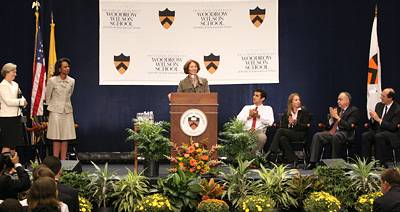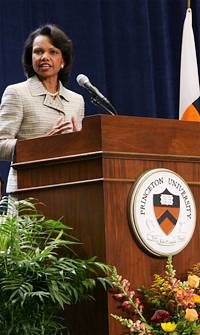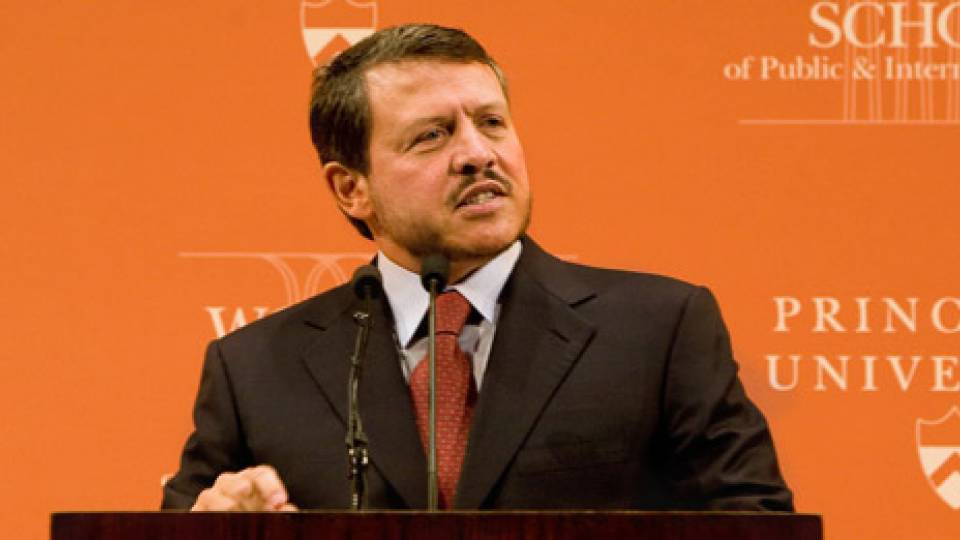U.S. Secretary of State Condoleezza Rice offered a resolute defense
of the U.S. war in Iraq during a Sept. 30 address at Princeton
University, and evoked memories of the once-unimaginable fall of
communism in projecting a future of peace and democracy in the Middle
East.
Rice delivered the keynote address marking the beginning of a year of
celebrations for the 75th anniversary of Princeton's Woodrow Wilson
School of Public and International Affairs. In her remarks to some
3,500 students, faculty, staff and guests of the University in Jadwin
Gymnasium, Rice affirmed the Bush administration's commitment to the
war in Iraq in the face of insurgency in that country and political
opposition in the United States.
"If we quit now, we will abandon Iraq's democrats at their time of
greatest need," she said. "We will embolden every enemy of liberty and
democracy across the Middle East. We will destroy any chance that the
people of this region have of building a future of hope and
opportunity. And we will make America more vulnerable.
"If we abandon future generations in the Middle East to despair and
terror, we also condemn future generations in the United States to
insecurity and fear."
Acknowledging that the vision of a peaceful, democratic Middle East
"can seem very distant at times," Rice maintained that "we must
recognize, as we do in every other region of the world, that liberty
and democracy are the only guarantees of true stability and lasting
security.
"There are those who worry that greater freedom of choice in the Middle
East will only liberate and empower extremism. In fact, the opposite is
true: A political culture of transparency and openness is not one in
which extremist beliefs can ultimately thrive," she said.
Rice cited varying levels of democratic reforms in Afghanistan,
Lebanon, Palestine, Egypt and Saudi Arabia as evidence that the Middle
East is moving toward a more politically open future.
"We have set out to help the people of the Middle East transform
their societies. Now is not the time to falter or fade," she said.
"Only four years ago, the democrats of the Arab world were hiding in
silence, or languishing in prison, or fearing for their very lives.
Now, from Cairo and Ramallah to Beirut and Baghdad, men and women are
finding new spaces of freedom to assemble and debate and build a better
world for themselves and for their children.
"They most certainly have determined enemies. But they also have
determined defenders. And it is possible to envision a future Middle
East where democracy is thriving, where human rights are secure, and
where hope and opportunity are within the reach of these people."

In drawing a parallel between the strife in the Middle East today
and the spread of communism in the decades after World War II, Rice
stressed that adherence to democratic ideals could bring about
seemingly unimaginable change. "Indeed, it must have seemed quite
impossible that we would one day stand at a juncture where Eastern
Europe would be liberated, Russia would emerge, and Europe would be
whole and free and at peace," she said.
Rice emphasized the lessons she learned from the work of U.S. statesmen
such as George Marshall, Dean Acheson and Arthur Vandenberg. "If we
think back on those days, we recognize that extraordinary times are
turbulent and they are hard. And it is very often hard to see a clear
path," she said. "But if you are -- as those great architects of the
post-Cold War victory were -- … true to your values, if you are certain
of your values, and if you act upon them with confidence and with
strength, it is possible to have an outcome where democracy spreads and
peace and liberty reign.
"Because of the work that they did, it is hard to imagine war in Europe
again. So it shall be also for the Middle East," she said.
Prior to her address, Rice engaged in a roundtable discussion with
Wilson School students and alumni. Following her lecture, she took
questions from the audience on topics including Hamas, Latin America
and the structure of Iraq's government. Students and other attendees
said they appreciated the opportunity to hear the secretary of state in
person, even if some oppose the Bush administration's positions.
"I liked the speech," said sophomore Aaron Spolin. "She had a coherent
point of view. Although I'm a Democrat and I disagree with her, I think
she genuinely believes what she's doing will promote democracy."
"She argued very convincingly," added junior Emily Stolzenberg. "It's a
very ideological administration, and it's impossible to tell what the
course of one action will be. We'll only be able to look back years
from now and see whether it's worked."
"It was an excellent address," said Wilson School lecturer Frederick
Hitz. "She showed terrific command of all the subjects. … She got very
good questions, and I think she had a chance to show a little bit of
the vision of the administration in foreign policy."
In her introduction to Rice's address, Wilson School Dean Anne-Marie
Slaughter noted that Woodrow Wilson viewed America as "a great ideal, a
great body of principles," and that Rice has performed well "in service
to that ideal."
"When Secretary Rice represents us around the world, as she has done
tirelessly since taking office in January, she brings extraordinary
intelligence, accomplishment, discipline and drive to the job,"
Slaughter said. "She reflects an America in which things once thought
impossible have become possible."
In her welcoming remarks, Princeton
President Shirley M. Tilghman said, "For three-quarters of a century,
the Woodrow Wilson School has embodied Princeton's historic commitment
to public service."
The school was founded in 1930 as a small, interdisciplinary program at
the undergraduate level, with a graduate professional program added in
1948. "It is fitting that since 1948 the school has carried the name of
Woodrow Wilson, the 13th president of Princeton and the 28th president
of the United States. It was Wilson who exhorted all graduates of
Princeton to serve our nation, and it was Wilson who later exhorted the
nation to engage the world," Tilghman said.
Rice, a former provost of Stanford University, lauded the work of the
Wilson School and the many Princeton alumni who have served at the
highest levels of U.S. government.
"From George Kennan and John Foster Dulles to George Shultz and James
Baker and, of course, Woodrow Wilson, many renowned American statesmen
have worn the orange and black …" she said, referring to Princeton's
colors. "As a professor myself, I understand how important it is to
root the practice of statecraft in the study of statecraft, in the
systematic examination of politics and history and culture that the
Wilson School offers to its students."
To continue the Wilson School anniversary kickoff, Lt. Gen. David
Petraeus, a Princeton alumnus who has been in charge of the
Multi-National Security Transition Command in Iraq, and Michael
Chertoff, secretary of the U.S. Department of Homeland Security, will speak on Saturday, Oct. 1. A schedule of other events is available on the Wilson School's 75th anniversary Web site.
The full text of Rice's remarks is available on the State Department Web site. A Webcast of the address will be available on Princeton's Webmedia site.


